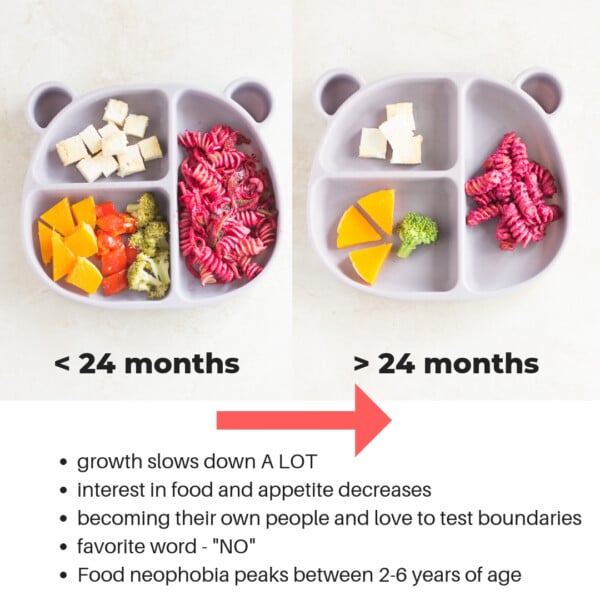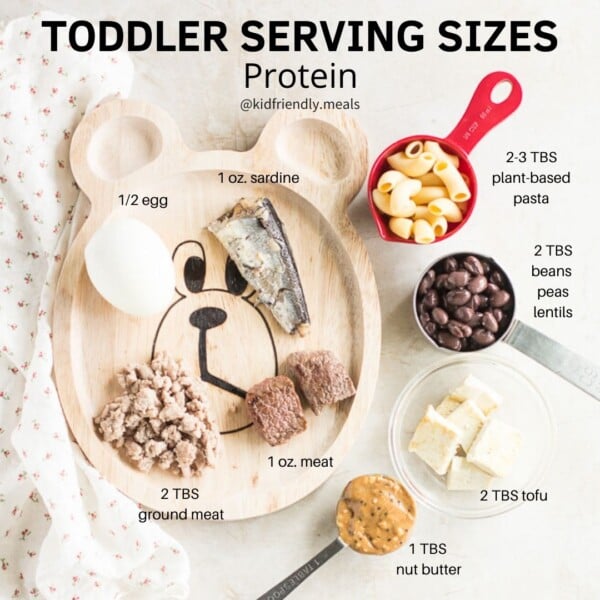This post may contain affiliate links. Please see our disclosure policy for more details.
What do I do when my child won’t eat dinner? Should I let them go hungry? Give them something I know they’ll eat? Are they eating enough? Will they sleep through the night? How picky is too picky?
We’ve all asked these questions at one point, and I truly hope this article will help answer them and give you the confidence to navigate through the situation.
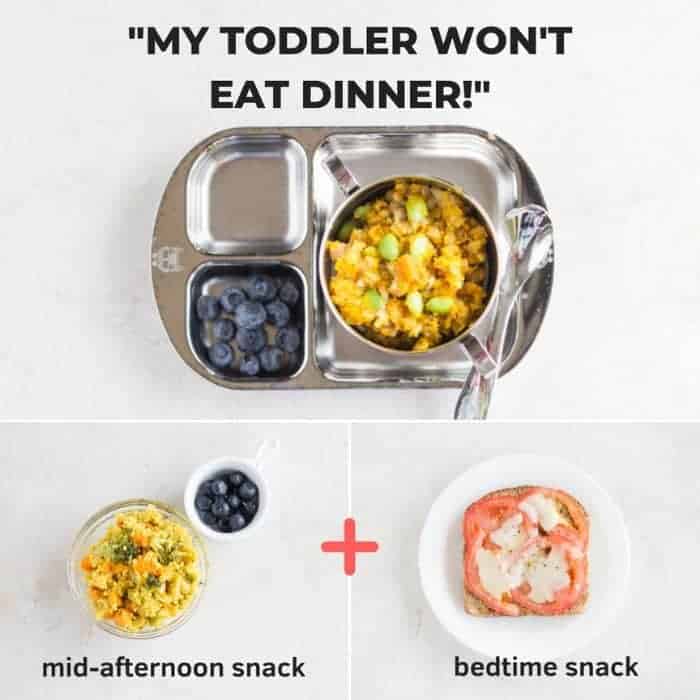
Table of Contents
- Is your toddler becoming picky?
- Toddler Not Eating Dinner
- When Dinner Isn’t the Only Meal Your Toddler Won’t Eat
- Dinner is the Only Meal Your Toddler Won’t Eat
- Toddler not eating dinner because they are constantly grazing.
- Toddler Won’t Eat Dinner Because They Feel Pressured To Eat
- Toddler Not Eating Dinner Because They Feel Anxious Around the Foods Served
- Toddler Not Eating Dinner Because They’re Holding Out For “Fun” Bedtime Snacks
- Toddler Won’t Eat Dinner – When To Worry

Is your toddler becoming picky?
Arm yourself with these strategies that will transform your mealtimes!
Toddler Not Eating Dinner
Let’s consider 2 possible scenarios when it comes to your child refusing dinner. Here’s how to handle each of them in a way that is least stressful for the parent (and the child) and most effective in encouraging your child to build healthy eating habits and positive associations with food.
When Dinner Isn’t the Only Meal Your Toddler Won’t Eat
Your toddler doesn’t seem all that interested in eating regardless of what time of the day. They were champion eaters during their first year (a.k.a the honeymoon phase) and all of a sudden turned into a picky eater.
Vegetables are a hard NO, although they may find some to be acceptable. Chicken is ok but beef is not. Foods can’t touch each other. Your toddler may obsess over a food only to reject it the next day. They eat as much as you at breakfast and eat hardly anything for the rest of the day. And on and on.
What to do:
I want to reassure you that these erratic and unpredictable eating habits are a NORMAL part of development and to-be-expected. Check out my post “my toddler won’t eat, here’s what to do” where I shared top reasons why your child might push the plate away.
This phase is definitely not fun, but it’s just that – a phase. And the less we interfere and make a big deal out of it, the quicker this phase will pass.
While it may seem like your child isn’t eating anything and meeting their nutritional requirements, when you consider their intake over a period of several days or weeks (don’t look at each day in isolation), most toddlers consume the necessary nutrients to grow and remain healthy.
Dinner is the Only Meal Your Toddler Won’t Eat
If you notice that your child eats well throughout the day but consistently struggles during dinner, here are some strategies you can consider implementing
Toddler Won’t Eat Dinner Because They are Too Tired
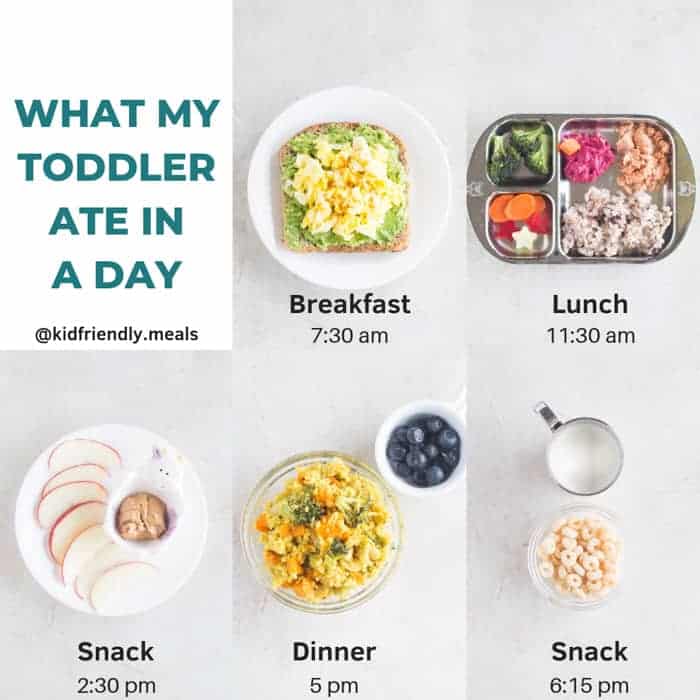
Perhaps dinner is scheduled too late, and your little one might be too tired to eat by then. It could be worth trying out different dinner times.
For example, if you’re normally eating dinner at 6pm, try 5:30 pm instead (or earlier). That would mean the rest of your eating schedule would have to be adjusted a bit.
While it’s typically advised to serve meals or snacks every 2-3 hours, if your child isn’t showing much hunger at dinner, you could experiment with stretching the time between meals a bit longer to see if they’re more inclined to eat.
And if you move up the dinner time to where there are more than 2 hours between dinner and bedtime, consider adding a bedtime snack if necessary! Always follow your child’s lead.
Here are all of our past mealtime schedules for reference.
Toddler not eating dinner because they are constantly grazing.
Does your child only want snacks, not meals?
Constant grazing refers to the habit of snacking frequently throughout the day instead of having structured meals. This can keep kids from eating dinner because it leaves them less hungry when it’s time for a proper meal.
Tip #1 – Stick to your mealtime schedule
As mentioned above, establishing a regular mealtime schedule creates consistency. Predictability can help them feel more comfortable and willing to eat.
Tip #2 – consider snacks as mini meals
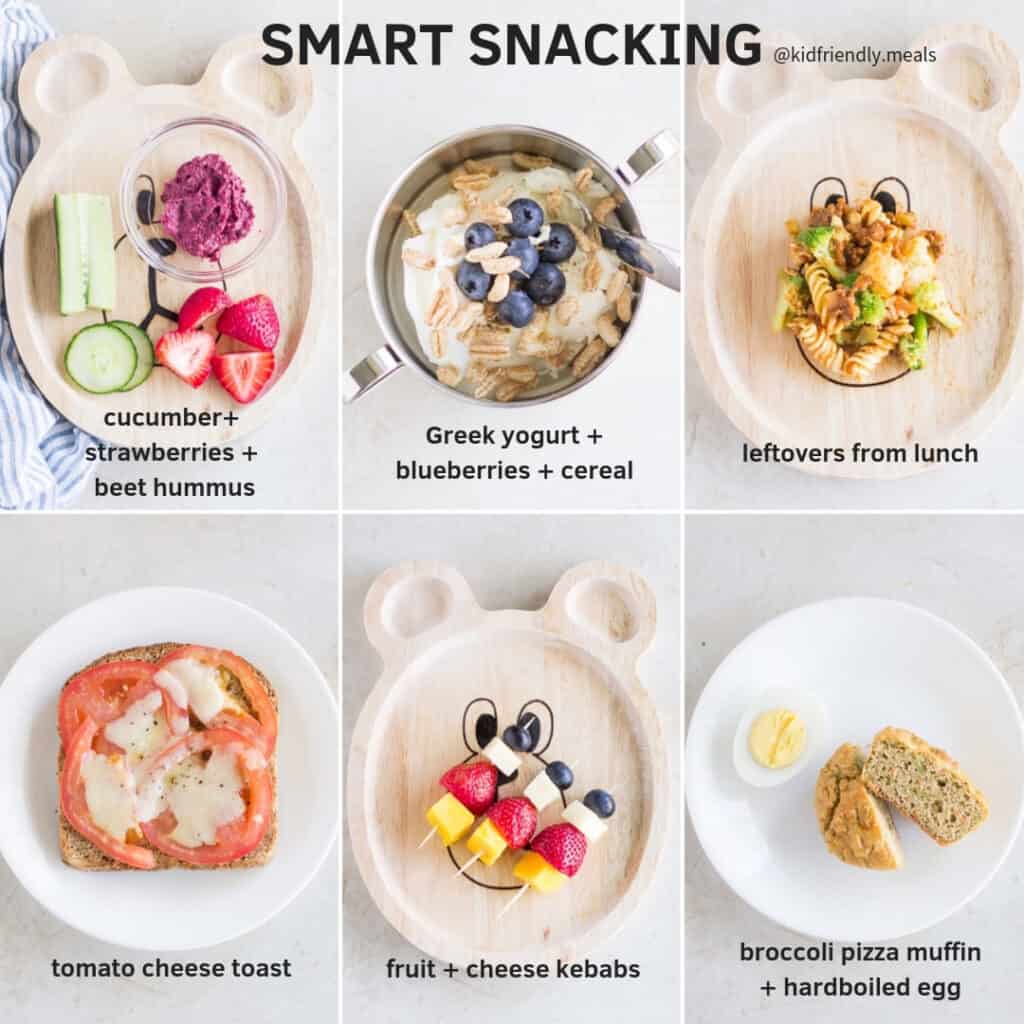
Aim to make snacks as well-balanced and nutritious as possible. Don’t just offer those typical “snack” foods (e.g. cereal, crackers, chips, etc.).
I always like to encourage parents to consider snacks as mini meals and use this opportunity to fill nutritional gaps from meals. This ensures that even if dinner isn’t eaten, you can be reassured that they received adequate nutrition throughout the day.
That means you are :
- Offering at least 2 food groups always including a source of protein/fat (so protein/fat + fruit and/or vegetable or protein/fat with a whole grain food). This will ensure that the snacks are filling and will keep them full until the next mealtime.
- Offering a variety of foods, not just their favorites. Don’t make snacks “exciting” for them by offering special foods. Instead, offer what you’d normally serve during mealtimes, just in smaller quantities.
- You don’t have to do this, but I personally strive to include some type of vegetable (even if it’s just one piece) for the sake of exposure. Veggies can be a hard-sell at this age and I want to take every opportunity for my child to see and decide what he wants to do with it.
Here are some specific examples:
- Apples and broccoli with peanut butter
- Egg and avocado toast + cucumber
- Yogurt with blueberries, grated carrots, ground nuts/seeds
- Savory Oatmeal with chopped zucchini and melted cheese
- Whole grain crackers with broccoli hummus
- Leftovers
- Fruit and Vegetable Smoothies
Toddler Won’t Eat Dinner Because They Feel Pressured To Eat
For many families, dinner is the only time everyone can gather and share a meal. This might be the case if your child is in daycare or preschool, and both parents are working.
However, with everyone gathered, your child might feel pressured to eat, which can create negative associations with mealtime and lead to mealtime resistance or refusal. Instead, here’s what to do:
- Create a Positive Environment: Make mealtime a relaxed and enjoyable experience. Avoid pressuring or bribing your child to eat.
- Offer Choices: Provide a variety of healthy options and let your toddler choose what they want to eat. This gives them a sense of control over their meal.
- Respect Their Appetite: Trust your toddler to eat according to their hunger cues. Avoid forcing them to finish their plate or eat certain foods.
- Model Healthy Eating Habits: Be a role model by demonstrating healthy eating behaviors. Show enthusiasm for trying new foods and enjoying meals together as a family.
- Set Realistic Expectations: Understand that toddlers’ appetites can vary from day to day. Some days they may eat more than others, and that’s okay.
Toddler Not Eating Dinner Because They Feel Anxious Around the Foods Served
Dinner often involves more complex meals or new foods, which can be off-putting to toddlers who are naturally wary of new tastes and textures.
To help toddlers overcome food anxiety, consider these strategies:
- Introduce Foods Gradually: Start with small portions of new foods alongside familiar ones to ease them into trying new flavors and textures.
- Be Patient: Offer foods multiple times, as it may take several exposures before a toddler is willing to try something new. Avoid pressuring them to eat, as this can increase anxiety.
- Make Meals Fun: Use colorful plates, fun utensils, and creative presentations to make mealtime enjoyable and less intimidating for toddlers.
- Offer Choices: Allow toddlers to have some control over their meals by offering choices. This can empower them and reduce anxiety. Here are the top 25 reader’s favorite kid-friendly dinners to try!
- Involve Them in Meal Preparation: Let toddlers help with age-appropriate tasks in the kitchen, such as washing vegetables or stirring ingredients. This can increase their interest in trying new foods.
- Be Patient: Understand that picky eating is a common phase of development and that it’s normal for toddlers to be cautious around new foods. Avoid making mealtimes a battleground and instead focus on creating a positive and relaxed atmosphere.
Toddler Not Eating Dinner Because They’re Holding Out For “Fun” Bedtime Snacks
I want to emphasize here that a bedtime snack is not necessary and shouldn’t be given if your child is occasionally skipping dinner.
But if your child is constantly refusing dinner, a bedtime snack may be necessary. However, DON’T offer “exciting” foods, such as typical packaged snack foods or desserts.
Why? Because your child might continue holding out on dinner so that they can enjoy their fun snack instead. Instead, offer simple snacks as mentioned above, like banana and peanut butter, carrot and hummus, hard-boiled egg, etc.
Now, your child might still refuse to eat the snack you served.
Honor their choice, enjoy the remaining time together, and give your child a big squeeze and a goodnight kiss. You just might be surprised to find that your child will sleep through the night just fine.
Toddler Won’t Eat Dinner – When To Worry
On one end of the spectrum is the typical picky eating as I described above. It’s super frustrating for the parents to see but the child is continuing to grow and develop appropriately.
On the other end of the spectrum is extreme picky eating, or ARFID (avoidant restrictive food intake disorder).
ARFID, previously referred to as “Selective Eating Disorder”, is a relatively new diagnosis in The Diagnostic and Statistical Manual of Mental Disorders (DSM-5).
It’s similar to anorexia in that both disorders are associated with limitations in the variety and the amount of food consumed. However, AFRID doesn’t involve anxiety around body shape or size, or fear of fatness.
So how can you make the distinction?
- Observe significant weight loss, nutritional deficiencies
- Not meeting developmental milestones
- Very limited in the number of foods they will eat and that becomes narrower over time (picky eating that progressively worsens)
- Extremely sensitive gag reflex when tasting, or even looking at foods. May even vomit
- Have extreme sensory aversion – the way it looks, smells, feels, tastes, etc.
- Appears very anxious and emotional around food
- Reports consistent, vague gastrointestinal issues around mealtimes that have no known cause (e.g. “upset stomach”, feels full)
- Consistently eating differently than the rest of the family
- None of the general feeding tips and advice work
- Dependence on enteral feeding or oral nutritional supplements
- There’s a level of social isolation for the child
If your toddler seem to meet a lot of these criteria, it might be worth seeking professional assistance.




